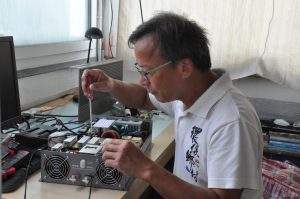Most people dispose of their unwanted appliances or give them to independent mobile collectors without a second thought of where they are going, and how they will be repaired or broken down for parts. Eddie Chan Wing-lai, vice-president of the Hong Kong Waste Electrical and Electronic Equipment (WEEE) Recycling Association, is worried about the careless discarding and treatment of used electronic devices.
“The stripping process sometimes takes place in poor families in Southeast Asian countries, and it releases chemicals that may greatly affect their health. Nine out of 10 recyclers are quite irresponsible,” says Chan.
Chan encourages the public to send unwanted appliances to collection centres approved by the association, even though they may not pay much back due to higher overheads. Chan’s association was set up in 2008 by members of the computer industry with the aim of administering, supervising and promoting recycling schemes for e-waste. Those that can be repaired are donated to the Caritas charity for people in need; those that cannot be saved are handled carefully by a recycling firm.

Chan, 60, has had a passion for repairing appliances since he was young. The TV, massage chair and speakers in his home were discarded items that he repaired himself. In fact, 60 per cent of his household appliances are refurbished. When Varsity visited him at home, he was attempting to fix a circuit board for a laptop computer.
Like Fixing Hong Kong’s Alung Wong, Chan thinks the way electronic products are designed and assembled nowadays encourages people to throw them away instead of fixing them. Chan explains there used to be several circuit boards in computers and TVs, each in charge of one function. Today, these are all found on the core motherboard in most electronic equipment, especially notebook computers.
“There is no difference between changing the whole circuit board and the laptop: a new laptop costs HK$6,000, while fixing the board alone costs HK$5,000. Which would you choose?” he asks.
Meanwhile, Chan says consumers are upgrading their computers so quickly to keep up with new features that a durable model might not be attractive. For one thing, it would cost more and for another, consumers are keen to change to the latest model every two or three years.
But this has not diminished Chan’s interest in repairing things. He is the first person his friends think of if they have a faulty appliance. It is a hobby he acquired as a boy who would check out the components of faulty devices that the street cleaners in his Shek Kip Mei neighbourhood collected and sold. This led to his obsession with fixing broken appliances and, when he went to university, Chan studied environmental science and energy management.
“If you are into something, you will be intoxicated by it,” he says. “A lot of things can be self-taught. I first learnt to be environmentally friendly on my own.”
Chan has installed rainwater collectors on the rooftop of the village house where he lives, and solar panels and windmills to generate electricity.






































